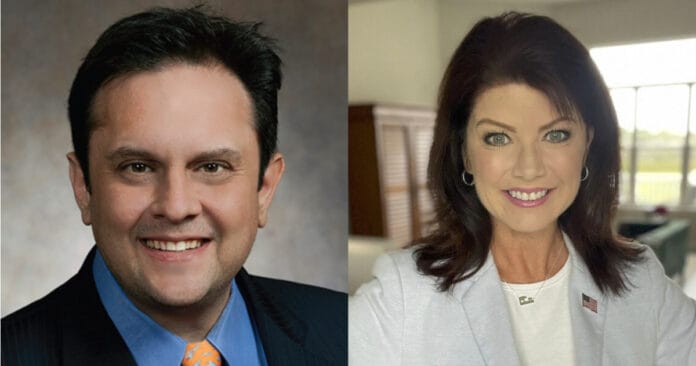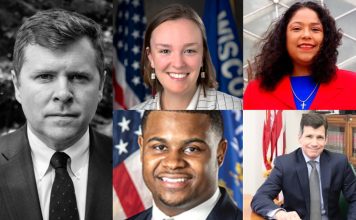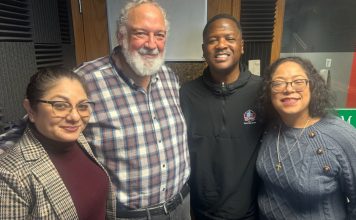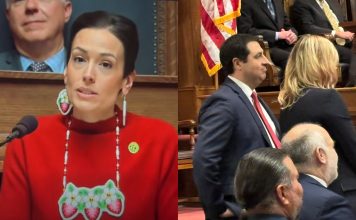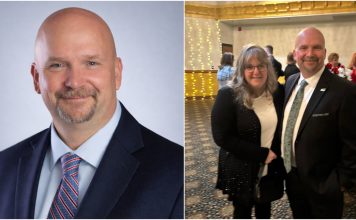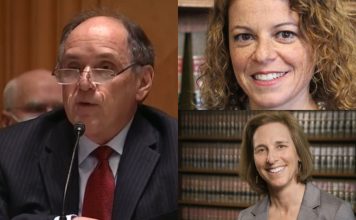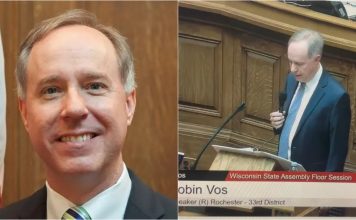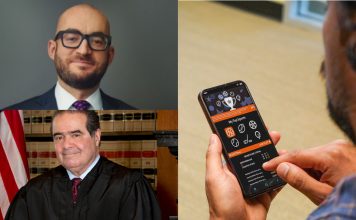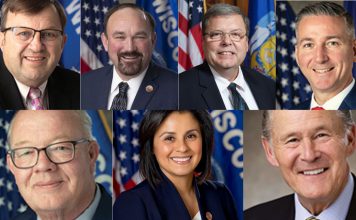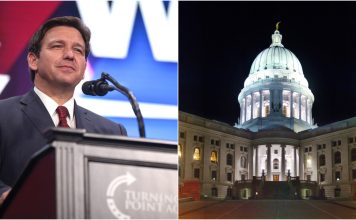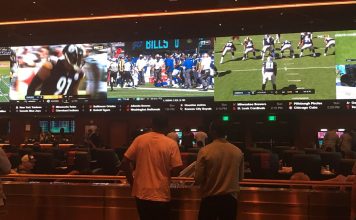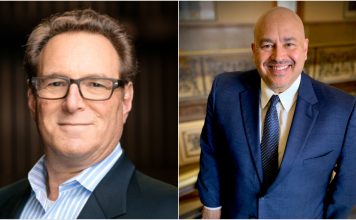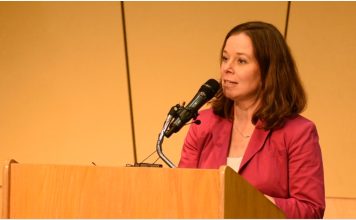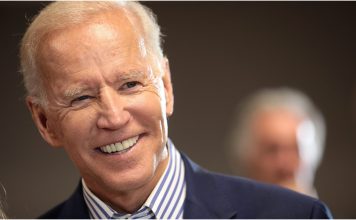Joel Kleefisch’s lobbying activities included supporting multiple Republican-sponsored pro-life bills.
Rebecca Kleefisch’s husband Joel, a former legislator, is a lobbyist. What for?
Joel Kleefisch is listed as a lobbyist in Wisconsin from 2019-2022. A review of all of the bills shows his lobbying activities included work for groups that focus on people with disabilities, virtual schools, and hunting and sportsman activities. He also lobbied for two organizations that push issues supporting deaf people.
Much of his lobbying doesn’t seem particularly controversial, and we did not find any positions that contradict conservative principles. For example, he was a lobbyist for a sportsman group when it lobbied to allow stocking of brook trout in Lake Michigan and the purchasing of dog training licenses online. His lobbying for two sportsman groups – the Wisconsin Game Preserve Association and Wisconsin Sporting Alliance – was most voluminous.
A few of the bills pushed by the groups tied to Joel Kleefisch’s lobbying waded into contentious issues. For example, he lobbied for a group that helps people with disabilities on multiple Republican-sponsored abortion-related pro-life bills. One bill supported by the group required health care providers present at abortions or attempted abortions to do everything they could to save the child’s life if the child is born alive. Another banned selective abortions based on race and congenital disabilities, including Down Syndrome, with the exception of “a life-limiting fetal anomaly.”
In another example, a group he lobbied for, the Wisconsin Game Preserve Association, pushed a bill that “maintains the option to have a license to carry a concealed weapon or a law enforcement identification card so that licensees or card holders may carry a concealed firearm in other states that require licensure and so that they do not violate federal law when possessing a firearm in a school zone.” He also lobbied to raise the age for buying cigarettes and vapes from 18 to 21.
Rebecca Kleefisch’s opponents have raised her husband’s lobbying as an issue after she criticized roadbuilding lobbyists she believes are supporting businessman Tim Michels. The Kleefisch campaign counters that Kleefisch’s remarks on lobbyists were specific to roadbuilders (she has criticized Michels’ involvement in groups that aggressively pushed to raise the gas tax in campaign ads. The gas tax helps fund the transportation fund used to build roads in the state. Over the years, Michels was board president and served on the board of such a group. His company helps fund them and company representatives have sat on boards.)
Joel Kleefisch is not running for governor, but, as a lobbyist, he is involved in public policy. He says he will give up his lobbying work if his wife wins. However, she clearly derives a financial interest from his lobbying. Thus, in our quest to educate voters and vet the candidates in the Republican primary, we decided to look up Joel Kleefisch’s lobbying history. What, exactly, has Joel Kleefisch lobbied for? We used state records to do so, going through each group and bill.
A Joel Kleefisch tied group also pushed a bill that “requires the Department of Natural Resources to authorize the hunting of sandhill cranes by individuals who have completed a sandhill crane hunter education course and who possess the appropriate approval issued by DNR.” He also lobbied for a group that deals with inmate vending issues, but the group opposed a Democratic bill. He lobbied for the Wisconsin Psychology Board, which supported requiring psychological exams for law enforcement officers, and which supported expanding mental health treatment allowed by state grants to counties and tribes.
He also lobbied for a group that wanted state government to use the phrase “intellectual disability” instead of “mental retardation.”
Joel Kleefisch lobbied for a group that supported repealing three DNR rules relating to hunting, fishing, and trapping for every new DNR rule passed.
You can see a summary of all of his lobbying activities below and decide for yourself what weight to give them. Here are the groups that Joel Kleefisch was a registered lobbyist for, and the bills that they were for and against.
2021-2022 Legislative Session
All American Association of Home Inspectors
What are they? “AAAHI represents home inspectors and their efforts to stay current with laws and regulations governing their industry. AAAHI offers educational training for continuing and would be home inspectors.”
The group’s lobbying interests: “All legislative and administrative matters that may affect the business of conducting home inspections by managers, owners, or employees of the home inspection industry.”
What did they lobby for? They lobbied for a bill relating to the regulation of home inspectors that modified the definition of a defect, required 40 hours of instruction to become a home inspector, and exempted newly registered home inspectors from continuing education requirements after the first two registration renewals.
A-Team Grassroots System Inc.
What are they? “Member families throughout Wisconsin share the common goal of grassroots efforts to educate and advocate for an understanding of the disabled community and its efforts to create employment, housing, and living opportunities. Its families engage with lawmakers and policymakers to support medicaid funding for a full array of service choice.”
Lobbying Interests: “A-team will work to influence the legislative process of budgeting and statute creation in an effort to advance the cause of benefiting people with disabilities in the workplace, society, and home. A-team will lobby to protect 14(c) status and the benefits it offers to employers and employees.”
What did they lobby for:
They lobbied for a bill that “establishes a rare disease advisory council in the Department of Health Services to advise DHS and provide recommendations to both the governor and the legislature regarding issues relating to rare diseases.”
They lobbied for a bill that “requires the Department of Financial Institutions to study and report on establishing a Wisconsin qualified ABLE program under section 529A of the Internal Revenue Code allowing tax-exempt accounts for qualified expenses incurred by individuals with disabilities.”
They lobbied for a joint resolution “relating to: recognizing Employment Choice First as a means to preserve the dignity, self-esteem, and pride of individuals with disabilities in Wisconsin.”
CV Academics Inc.
What are they? “Promoting and selling a virtual platform connecting students with educational opportunities and careers in healthcare and other professions.”
What are their lobbying interests? “Promoting and expanding school district’s abilities to utilize a virtual platform for students to engage in assistance in education, career selection and professional connections.”
What did they lobby for?
DCI Group AZ L.L.C.
What are they? “DCI Group is an independent public affairs firm specializing in strategic communications, coalition management, ally management, media relations, and digital advocacy.”
What are their lobbying interests?
“Relating to the regulation of vapor and tobacco products.”
What did they lobby for?
They lobbied for a bill that “changes the age for purchasing cigarettes, tobacco products, or nicotine products from 18 to 21, and imposes the same minimum age for purchasing vapor products.”
Numotion
What are they? “Numotion produces, fits, and sells mobility equipment for people with disabilities.”
What are their lobbying interests? “Numotion intends to lobby the administration during the rule making process as it applies to 2017 Wisconsin Act 306. Numotion intends to lobby the legislature, executive branch, and administration in relation to medicaid funding for mobility standing technology for people with disabilities.”
What did they lobby for?
They lobbied for a bill to establish “more circumstances under which DHS reimburses a provider for a complex rehabilitation technology prescribed for a recipient of Medical Assistance who resides in a nursing home…Relating to: reimbursement of wheelchairs and power mobility devices for recipients of Medical Assistance who reside in a nursing home.”
Union Supply Group
What are they? “Union Supply provides food, apparel, footwear, electronics, and personal-care products to State, Federal and County correctional institutions nationwide.”
What are their lobbyist interests? Issues relating to amending state law to personal property items to inmates.
What did they lobby for?
The group lobbied against a Democratic bill that would do the following:
“This bill requires the Department of Corrections to contract with no fewer than three vendors to provide hobby, religious, and other personal property items for sale to inmates in state correctional institutions. Under the bill, DOC must allow an inmate, or a third party on behalf of an inmate, to purchase the items and must give inmates equal access to all vendors that DOC contracts with for this purpose. The bill also specifies that DOC must ensure that at least one of the vendors offers a storefront in the city of Milwaukee where a third party may place an order for items to be delivered to an inmate.”
Wisconsin Game Preserve Association
What are they? “WGPA is a business association comprised of game bird breeders, sport shooting facilities, owners, managers and specialty vendors who provide services and products used by the industry as part of Wisconsin’s sport and hunting heritage.”
What are their lobbying interests? “The Wisconsin Game Preserve Association will be active in all legislative and administrative areas of our state government that affect the ownership, operation or management of our businesses . We continue to work closely with the DATCP in the areas of animal health disease and rural economic development. We honor the sporting heritage of our state and add to to the alternative agricultural economy.”
What did they lobby for?
A bill that “provides that the prohibition on entering or remaining on railroad
tracks does not apply to a person walking directly across the tracks or right-of-way
of a railroad.”
A bill that “makes numerous changes so that farm-raised game bovids are treated
in the same manner as farm-raised deer.”
A bill that “requires the Department of Natural Resources to prepare a report that
identifies opportunities for partnering with the private aquaculture industry for
increased stocking of desirable sport fish in lakes and streams.”
A bill that “requires the Department of Natural Resources to prepare a report that
identifies ways to consolidate or eliminate hunting, fishing, and trapping approvals
to reduce the total number of types of approvals.”
A bill that “requires the Department of Natural Resources to create a biennial
work plan that establishes priorities and goals for habitat work on lands managed
by DNR and measures progress on established priorities and goals.”
A bill that “requires the Department of Natural Resources to offer dog training
licenses for purchase through the electronic system DNR uses for the purchase of
hunting and other approvals (known as GoWild).”
A bill that “requires the Department of Natural Resources to authorize the
hunting of sandhill cranes by individuals who have completed a sandhill crane
hunter education course and who possess the appropriate approval issued by DNR.”
A bill that “maintains the option to have a license to carry a concealed weapon or
a law enforcement identification card so that licensees or card holders may carry a
concealed firearm in other states that require licensure and so that they do not
violate federal law when possessing a firearm in a school zone.”
A bill that “provides that an individual may satisfy the in-person field testing
requirement by participating in a mentored hunt.”
A bill that “requires the Department of Natural Resources to modify
administrative rules relating to the hunting of wild turkeys to combine hunting
zones and seasons and to modify youth hunting restrictions.”
A bill that “requires the Department of Natural Resources to prepare a report that
identifies public access opportunities on all lands owned or managed by DNR, land
acquired under the Warren Knowles-Gaylord Nelson stewardship program, and
open managed forest lands.”
A bill that “requires DNR to annually stock Lake Michigan with at least 100,000 brook trout.”
A bill that “provides that, for each new rule that the Department of Natural
Resources promulgates relating to hunting, fishing, or trapping, DNR must repeal
three existing rules relating to hunting, fishing, or trapping.”
A bill relating to “stocking pheasants for hunting.”
Wisconsin Psychological Association
What they lobby for: “Our Mission is to advance psychology as a profession which promotes human welfare through the ethical application of psychological principles in research, teaching and practice. We provide a professional identity for psychologists by maintaining active affiliation with APA We advocate on behalf of the profession and the interests of our members. We encourage a scientific attitude toward psychological practice We provide forums for the professional exchange of information and opinion about the diversity of psychological issues and of the profession itself. We address concerns of our communities by responding as a profession to psychological and social needs of Wisconsin citizens We educate the public about psychology and psychological issues.”
Lobbying interests: “Licensing Bill that is being introduced. Interest related to mental health and public education surrounding mental health. Our Mission is to advance psychology as a profession which promotes human welfare through the ethical application of psychological principles in research, teaching and practice. We provide a professional identity for psychologists by maintaining active affiliation with APA We advocate on behalf of the profession and the interests of our members. We encourage a scientific attitude toward psychological practice We provide forums for the professional exchange of information and opinion about the diversity of psychological issues and of the profession itself. We address concerns of our communities by responding as a profession to psychological and social needs of Wisconsin citizens We educate the public about psychology and psychological issues.”
What did they lobby for?
A bill that “makes various revisions to the laws governing the examining board and the practice of psychology.”
A bill that “provides that the LESB (Law Enforcement Standards Board) must require, prior to employment on a full-time basis as a law enforcement officer, that an individual submit to a psychological examination to determine the individual’s suitability to perform the duties of an officer. The LESB must promulgate administrative rules to govern the administration and interpretation of such psychological examinations, including the type of test to be used and the time limits on such an examination’s applicability. The examination must be paid for by the prospective employer. The records associated with the examination must be kept confidential and are not subject to public disclosure, but may be disclosed by the prospective employer to other prospective employers.”
A bill that “ratifies and enters Wisconsin into the Psychology Interjurisdictional
Compact (compact), which provides for the ability of a psychologist to practice more
easily in other compact states.”
A bill that says: “Under current law, the Department of Justice, in collaboration with the Department of Corrections and the Department of Health Services, awards grants to counties and tribes that have established qualifying treatment alternatives and diversion (TAD) programs that offer alcohol or drug treatment services as alternatives to prosecution or incarceration in order to reduce recidivism, promote public safety, and reduce prison and jail populations. Under the bill, a program funded by a TAD grant need not focus solely on alcohol and other drug treatment, but may provide treatment programs for a person who has any mental illness.”
A bill that “combines the child psychiatry consultation program with additional
services into a new mental health consultation program.”
Wisconsin Sporting Alliance
What they are: “Business Or Interest: promoting the use and conservation of Wisconsin’s natural resources. Promoting hunting and fishing. Introduction of new users of Wisconsin’s great outdoors.”
Lobbying Interests: “Hunting, fishing, and utilization and preservation of Wisconsin’s natural resources.”
What they lobbied for:
A bill that “provides that the prohibition on entering or remaining on railroad
tracks does not apply to a person walking directly across the tracks or right-of-way
of a railroad.”
The bill that “makes numerous changes so that farm-raised game bovids are treated
in the same manner as farm-raised deer.”
A bill that “requires the Department of Natural Resources to prepare a report that
identifies opportunities for partnering with the private aquaculture industry for
increased stocking of desirable sport fish in lakes and streams.”
A bill that “requires the Department of Natural Resources to prepare a report that
identifies ways to consolidate or eliminate hunting, fishing, and trapping approvals
to reduce the total number of types of approvals DNR is required to issue.”
A bill that “requires the Department of Natural Resources to create a biennial
work plan that establishes priorities and goals for habitat work on lands managed
by DNR and measures progress on established priorities and goals.”
A bill that “requires the Department of Natural Resources to offer dog training
licenses for purchase through the electronic system DNR uses for the purchase of
hunting and other approvals (known as GoWild).”
A bill that “requires the Department of Natural Resources to authorize the
hunting of sandhill cranes by individuals who have completed a sandhill crane
hunter education course and who possess the appropriate approval issued by DNR.”
The same gun bill as mentioned above.
A bill that “provides that an individual may satisfy the in-person field testing
requirement by participating in a mentored hunt.”
A bill that “requires the Department of Natural Resources to modify
administrative rules relating to the hunting of wild turkeys to combine hunting
zones and seasons and to modify youth hunting restrictions.”
The same bill mentioned above on public land access.
The same bill mentioned above on stocking brooking trout.
A bill that “provides that, for each new rule that the Department of Natural Resources promulgates relating to hunting, fishing, or trapping, DNR must repeal three existing rules relating to hunting, fishing, or trapping.”
A bill that “requires the Department of Natural Resources to establish a schedule for stocking pheasants to ensure adequate hunting opportunities through the end of each pheasant hunting season.”
2019-2020 legislative session
Note: He is not listed as “exclusive” lobbyist for any of the following.
All American Association of Home Inspectors
See above for what the group is.
What did the group lobby for this session?
They supported a bill that that involved laws governing home inspectors. Among other things, it required home inspectors to be licensed, rather than registered.
A-Team Grassroots System Inc.
See above for a description of the group.
They lobbied for a bill that “substitutes the phrase ‘intellectual disability’ and similar phrases for ‘mental retardation,’ ‘mentally retarded,’ and similar phrases in rules promulgated by the Department of Health Services, the Department of Children and Families, the Public Service Commission, the Department of Safety and Professional Services, and the Department of Workforce Development. The bill also changes the definition of ‘intellectual disability’ in rules promulgated by DHS.”
The group supported a bill that “requires any health care provider present at the time an abortion or attempted abortion results in a child born alive to exercise the same degree of professional skill, care, and diligence to preserve the life and health of the child as a reasonably diligent and conscientious health care provider would render to any other child born alive at the same gestational age and to ensure that the child born alive is immediately transported and admitted to a hospital.”
The group supported a Republican bill that “requires certain information regarding an abortion-inducing drug regimen to be provided to a woman that is planning to have an abortion induced by the abortion-inducing drug regimen. This bill also adds to the information required to be reported for induced abortions.”
The group supported a Republican bill that “prohibits the Department of Health Services from certifying, and requires DHS to decertify, as a provider for Medical Assistance a person that provides abortion services or is an affiliate of a person that provides abortion services and that is a nonprofit private entity that has received at any time or has applied for a grant or contract for a family planning project under federal law.”
The group supported a Republican bill that “prohibits a person from performing or inducing or attempting to perform or induce an abortion on a woman if the person knows the woman is seeking an abortion solely because of the race, color, national origin, ancestry, or sex of the unborn child or solely because the unborn child has been diagnosed with or has a potential diagnosis of Down syndrome or another congenital disability. A congenital disability is defined in the bill as any congenital disease, defect, or disorder, except a life-limiting fetal anomaly, which is a profound and irremediable congenital or chromosomal anomaly that is incompatible with sustaining life after birth and does not include any condition that can be treated.”
The group supported a Republican bill that “prohibits the Department of Health Services from certifying, and requires DHS to decertify by July 1, 2020, a provider under the Medical Assistance program that is a private entity that provides abortion services or is an affiliate of a person that provides abortion services.”
A bill that “modifies the definition of complex rehabilitation technology and requires the Department of Health Services to defer to the determination of a physician regarding the medical necessity of a complex rehabilitation technology item or service and, upon a physician’s determination of medical necessity, consider a complex rehabilitation technology item or service for a complex needs patient as medically necessary for purposes of reimbursement under this Medical Assistance program.”
A bill that “requires the Department of Health Services to establish for the 2019-21 fiscal biennium a community-based services grant program to distribute awards to provider organizations offering facility-based prevocational and day services who apply to initiate or increase and sustain their provision of community-based services that create pathways to and increase competitive integrated employment for people with disabilities.”
DCI Group AZ L.L.C.
The group supported a bill that “changes the age for purchasing cigarettes, tobacco products, or nicotine products from 18 to 21, and imposes a minimum age for purchasing vapor products.”
Numotion
The group supported a bill that “modifies the definition of complex rehabilitation technology and requires the Department of Health Services to defer to the determination of a physician regarding the medical necessity of a complex rehabilitation technology item or service and, upon a physician’s determination of medical necessity, consider a complex rehabilitation technology item or service for a complex needs patient as medically necessary for purposes of reimbursement under this Medical Assistance program.”
Wisconsin Association of the Deaf
The group supported a bill relating to changing rules for sign language interpreters.
Wisconsin Game Preserve Association
The group supported a bill that says the “DNR may not prohibit the transportation of a deer carcass out of the county in which it was harvested. Also under the bill, DNR must require that all parts of a deer carcass be removed from the field, except for entrails.”
The group was against a bill that “prohibits the organization of and participation in contests for killing wild animals.”
Wisconsin Psychological Association
The group supported a bill that “requires the Department of Health Services to award 50 grants, each lasting for two fiscal years and in the amount of $75,000 per fiscal year per grant, to local branches of statewide private nonprofit organizations that apply and that satisfy criteria specified in the bill, including that the organization be able to raise $25,000, which it must contribute to support the trauma-informed care position and administrative expenses for trauma-informed care programming.”
The group supported a bill that “makes various revisions to the laws governing the board and the practice of psychology.”
The group supported a bill that “requires the Department of Public Instruction to annually provide a grant to the Center for Suicide Awareness, Inc. The purpose of the grant is to provide funding for staff, training, and expenses related to operating a text-based suicide prevention service. In each of the 2019-20 and 2020-21 fiscal years, the amount of the grant to the Center for Suicide Awareness, Inc., is $110,000.”
Wisconsin Registry of Interpreters for the Deaf
The group was for a bill that changed regulations for sign-language interpreters.
Table of Contents


